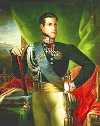 The complex and controversial king of Sardinia-Piedmont from 1831 to 1849, Charles Albert helped inspire the growing drive for Italian independence. In 1848, the spread of revolutionary ideas forced him to grant a constitution. Seeking to lead the liberation of Italy, he went to war with Austria that same year, and again in 1849, but was twice defeated. After abdicating in favor of his son, he went into exile and soon died. Charles was called the “number one enemy” of what? Discuss
The complex and controversial king of Sardinia-Piedmont from 1831 to 1849, Charles Albert helped inspire the growing drive for Italian independence. In 1848, the spread of revolutionary ideas forced him to grant a constitution. Seeking to lead the liberation of Italy, he went to war with Austria that same year, and again in 1849, but was twice defeated. After abdicating in favor of his son, he went into exile and soon died. Charles was called the “number one enemy” of what? Discuss
Source: The Free Dictionary
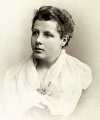 Besant was an English social reformer who, in 1889, embraced theosophy, a religious philosophy with mystical concerns. She served as international president of the Theosophical Society from 1907 until her death. After moving to India in 1893, she became an independence leader and established the Indian Home Rule League. She was president of the Indian National Congress in 1917 but later split with Gandhi. Besant lost custody of her children and was nearly imprisoned for publishing what in 1877?
Besant was an English social reformer who, in 1889, embraced theosophy, a religious philosophy with mystical concerns. She served as international president of the Theosophical Society from 1907 until her death. After moving to India in 1893, she became an independence leader and established the Indian Home Rule League. She was president of the Indian National Congress in 1917 but later split with Gandhi. Besant lost custody of her children and was nearly imprisoned for publishing what in 1877? 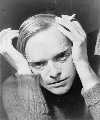 Capote’s first novel, Other Voices, Other Rooms, launched a literary career that included the novella Breakfast at Tiffany’s and his innovative “nonfiction novel” In Cold Blood, a chilling account of the senseless, brutal murder of a Kansas family that is widely considered his finest work. Capote cultivated celebrity and was famous in later years for his jet-setting lifestyle as well as his writing. Capote was reportedly the inspiration for a character in what famous novel?
Capote’s first novel, Other Voices, Other Rooms, launched a literary career that included the novella Breakfast at Tiffany’s and his innovative “nonfiction novel” In Cold Blood, a chilling account of the senseless, brutal murder of a Kansas family that is widely considered his finest work. Capote cultivated celebrity and was famous in later years for his jet-setting lifestyle as well as his writing. Capote was reportedly the inspiration for a character in what famous novel? 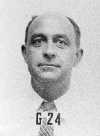 Italian-American physicist Enrico Fermi is known today as the “father of the atomic bomb.” Fermi conducted early experiments with neutrons and was awarded the 1938 Nobel Prize in Physics. After receiving the award in Stockholm, Fermi and his family chose not return to Fascist Italy and instead settled in the US. There, he created the first self-sustaining chain reaction in 1942 and later worked on the atomic bomb. What so-called paradox named for Fermi involves extraterrestrial intelligent life?
Italian-American physicist Enrico Fermi is known today as the “father of the atomic bomb.” Fermi conducted early experiments with neutrons and was awarded the 1938 Nobel Prize in Physics. After receiving the award in Stockholm, Fermi and his family chose not return to Fascist Italy and instead settled in the US. There, he created the first self-sustaining chain reaction in 1942 and later worked on the atomic bomb. What so-called paradox named for Fermi involves extraterrestrial intelligent life? 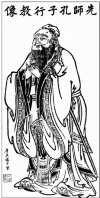 Positive evidence concerning the life of the Chinese sage Confucius is sparse, and modern scholars base their accounts largely on the Analects, a collection of sayings and conversations apparently recorded by his disciples. Distressed by the constant warfare between the Chinese states and by the venality and tyranny of the rulers, Confucius urged a system of morality and government that would promote peace and stability. According to tradition, he compiled or edited what corpus of books?
Positive evidence concerning the life of the Chinese sage Confucius is sparse, and modern scholars base their accounts largely on the Analects, a collection of sayings and conversations apparently recorded by his disciples. Distressed by the constant warfare between the Chinese states and by the venality and tyranny of the rulers, Confucius urged a system of morality and government that would promote peace and stability. According to tradition, he compiled or edited what corpus of books? 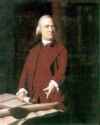 Samuel Adams was an American Revolutionary leader and patriot. In the mid-1760s, he drafted protests against Great Britain’s Stamp and Townshend Acts and authored pamphlets designed to stir up sentiment against the British. Adams helped organize the revolutionary Sons of Liberty, was the chief instigator of the Boston Tea Party, served on the Continental Congress, and signed the Declaration of Independence. How was he related to John Adams?
Samuel Adams was an American Revolutionary leader and patriot. In the mid-1760s, he drafted protests against Great Britain’s Stamp and Townshend Acts and authored pamphlets designed to stir up sentiment against the British. Adams helped organize the revolutionary Sons of Liberty, was the chief instigator of the Boston Tea Party, served on the Continental Congress, and signed the Declaration of Independence. How was he related to John Adams? 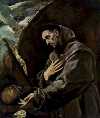 The patron saint of animals, Saint Francis of Assisi was an Italian monk canonized as a saint in 1228. Born into a wealthy family, he was a soldier and prisoner of war before he experienced a conversion in his early 20s. He sold his property, gave the money to the church, and began a life of poverty and devoutness. He soon attracted followers and became the founder of the Franciscan order of friars. Catholics believe that Saint Francis was the first person to exhibit stigmata, which are what?
The patron saint of animals, Saint Francis of Assisi was an Italian monk canonized as a saint in 1228. Born into a wealthy family, he was a soldier and prisoner of war before he experienced a conversion in his early 20s. He sold his property, gave the money to the church, and began a life of poverty and devoutness. He soon attracted followers and became the founder of the Franciscan order of friars. Catholics believe that Saint Francis was the first person to exhibit stigmata, which are what? 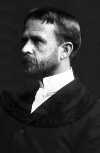 Morgan was an American zoologist noted for his ingenious demonstration of the physical basis of heredity and the importance of the gene. He was awarded the Nobel Prize in Physiology or Medicine in 1933. Initially skeptical of Gregor Mendel’s research and Charles Darwin’s theory of natural selection, Morgan performed rigorous experiments demonstrating that genes were discrete chromosomal units of heredity. Much of his research was done by observing Drosophila melanogaster, which is what?
Morgan was an American zoologist noted for his ingenious demonstration of the physical basis of heredity and the importance of the gene. He was awarded the Nobel Prize in Physiology or Medicine in 1933. Initially skeptical of Gregor Mendel’s research and Charles Darwin’s theory of natural selection, Morgan performed rigorous experiments demonstrating that genes were discrete chromosomal units of heredity. Much of his research was done by observing Drosophila melanogaster, which is what? 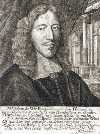 De Witt was a Dutch statesman who played a vital role in the three successive Dutch Wars. He helped end the first in 1654, but the English Restoration was considered a threat to Dutch interests and the conflict was renewed in 1665. He was largely responsible for securing for the Dutch the favorable terms of the treaty that ended the second of the wars and helped form the Triple Alliance against Louis XIV, who nevertheless invaded Holland in 1672. Why was de Witt lynched shortly thereafter?
De Witt was a Dutch statesman who played a vital role in the three successive Dutch Wars. He helped end the first in 1654, but the English Restoration was considered a threat to Dutch interests and the conflict was renewed in 1665. He was largely responsible for securing for the Dutch the favorable terms of the treaty that ended the second of the wars and helped form the Triple Alliance against Louis XIV, who nevertheless invaded Holland in 1672. Why was de Witt lynched shortly thereafter? .jpg) Mary Mallon was the first person in the US to be identified as a healthy carrier of typhoid fever. In 1904, a typhoid epidemic was traced to homes where she had been a cook. She fled but was located by authorities and forcibly quarantined for several years. In 1910, she was released on the condition that she not take another food-handling job. Discovered cooking again in 1914, she was quarantined for life. Though she herself never had the disease, she infected about 50 people. How many died?
Mary Mallon was the first person in the US to be identified as a healthy carrier of typhoid fever. In 1904, a typhoid epidemic was traced to homes where she had been a cook. She fled but was located by authorities and forcibly quarantined for several years. In 1910, she was released on the condition that she not take another food-handling job. Discovered cooking again in 1914, she was quarantined for life. Though she herself never had the disease, she infected about 50 people. How many died?